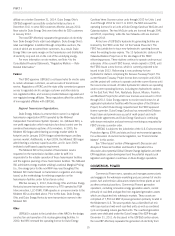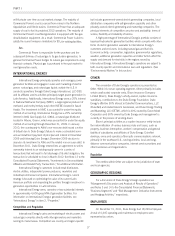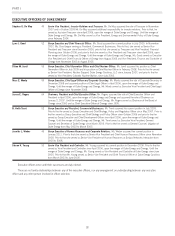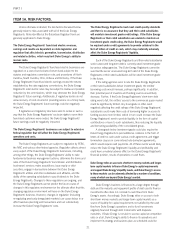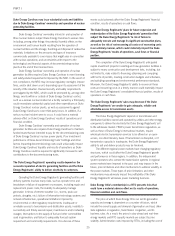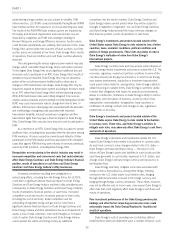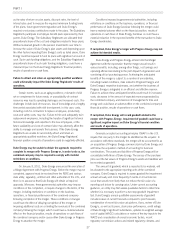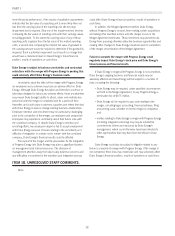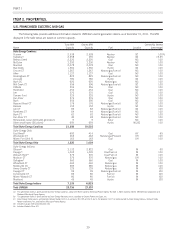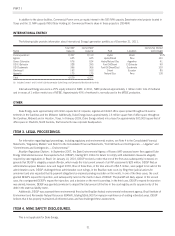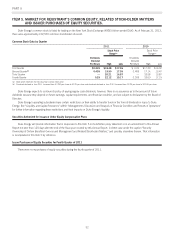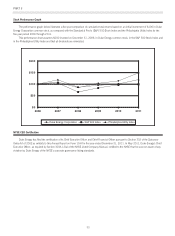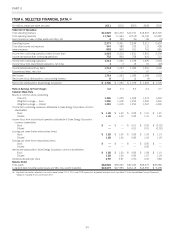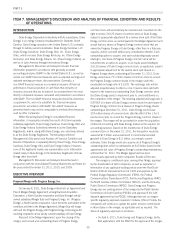Duke Energy 2011 Annual Report Download - page 45
Download and view the complete annual report
Please find page 45 of the 2011 Duke Energy annual report below. You can navigate through the pages in the report by either clicking on the pages listed below, or by using the keyword search tool below to find specific information within the annual report.
PART I
Duke Energy Carolinas may incur substantial costs and liabilities
due to Duke Energy Carolinas’ ownership and operation of nuclear
generating facilities.
Duke Energy Carolinas’ ownership interest in and operation of
three nuclear stations subject Duke Energy Carolinas to various risks
including, among other things: the potential harmful effects on the
environment and human health resulting from the operation of
nuclear facilities and the storage, handling and disposal of radioactive
materials; limitations on the amounts and types of insurance
commercially available to cover losses that might arise in connection
with nuclear operations; and uncertainties with respect to the
technological and financial aspects of decommissioning nuclear
plants at the end of their licensed lives.
Duke Energy Carolinas’ ownership and operation of nuclear
generation facilities requires Duke Energy Carolinas to meet licensing
and safety-related requirements imposed by the NRC. In the event of
non-compliance, the NRC may increase regulatory oversight, impose
fines, and/or shut down a unit, depending upon its assessment of the
severity of the situation. Revised security and safety requirements
promulgated by the NRC, which could be prompted by, among other
things, events within or outside of Duke Energy Carolinas’ control,
such as a serious nuclear incident at a facility owned by a third-party,
could necessitate substantial capital and other expenditures at Duke
Energy Carolinas’ nuclear plants, as well as assessments against
Duke Energy Carolinas to cover third-party losses. In addition, if a
serious nuclear incident were to occur, it could have a material
adverse effect on Duke Energy Carolinas’ results of operations and
financial condition.
Duke Energy Carolinas’ ownership and operation of nuclear
generation facilities also requires Duke Energy Carolinas to maintain
funded trusts that are intended to pay for the decommissioning costs
of Duke Energy Carolinas’ nuclear power plants. Poor investment
performance of these decommissioning trusts’ holdings and other
factors impacting decommissioning costs could unfavorably impact
Duke Energy Carolinas’ liquidity and results of operations as Duke
Energy Carolinas could be required to significantly increase its cash
contributions to the decommissioning trusts.
The Duke Energy Registrants’ operating results depend on the
successful operation of electric generating facilities and the Duke
Energy Registrants’ ability to deliver electricity to customers.
Operating the Duke Energy Registrants’ generating facilities and
delivery systems involves many risks, such as operator error and
breakdown or failure of equipment or processes, including repair and
replacement power costs; the inability to adequately manage
generation in times of extreme weather (i.e., storms, peak use
periods, droughts, etc.); failure of information technology systems and
network infrastructure; operational limitations imposed by
environmental or other regulatory requirements; inadequate or
unreliable access to transmission and distribution assets; inability to
successfully and timely execute repair, maintenance and/or refueling
outages; interruptions to the supply of fuel and other commodities
used in generation; and failure to adequately forecast system
requirement and commodity requirements. Occurrences of these
events could adversely affect the Duke Energy Registrants’ financial
condition, results of operations or cash flows.
The Duke Energy Registrants’ plans for future expansion and
modernization of the Duke Energy Registrants’ generation fleet
subject the Duke Energy Registrants’ to risk of failure to
adequately execute and manage its significant construction plans,
as well as the risk of not recovering all costs or of recovering costs
in an untimely manner, which could materially impact the Duke
Energy Registrants’ results of operations, cash flows or financial
position.
The completion of the Duke Energy Registrants’ anticipated
capital investment projects in existing and new generation facilities is
subject to many construction and development risks, including, but
not limited to, risks related to financing, obtaining and complying
with terms of permits, meeting construction budgets and schedules,
and satisfying operating and environmental performance standards.
Moreover, the Duke Energy Registrants’ ability to recover all these
costs and recovering costs in a timely manner could materially impact
the Duke Energy Registrants’ consolidated financial position, results of
operations or cash flows.
The Duke Energy Registrants’ sales may decrease if the Duke
Energy Registrants’ are unable to gain adequate, reliable and
affordable access to transmission assets.
The Duke Energy Registrants’ depend on transmission and
distribution facilities owned and operated by utilities and other energy
companies to deliver the electricity the Duke Energy Registrants’ sell
to the wholesale market. FERC’s power transmission regulations, as
well as those of Duke Energy’s international markets, require
wholesale electric transmission services to be offered on an open-
access, non-discriminatory basis. If transmission is disrupted, or if
transmission capacity is inadequate, the Duke Energy Registrants’
ability to sell and deliver products may be hindered.
The different regional power markets have changing regulatory
structures, which could affect the Duke Energy Registrants’ growth
and performance in these regions. In addition, the independent
system operators who oversee the transmission systems in regional
power markets have imposed in the past, and may impose in the
future, price limitations and other mechanisms to address volatility in
the power markets. These types of price limitations and other
mechanisms may adversely impact the profitability of the Duke
Energy Registrants’ wholesale power marketing business.
Duke Energy Ohio’s membership in a RTO presents risks that
could have a material adverse effect on its results of operations,
financial condition and cash flows.
The price at which Duke Energy Ohio can sell its generation
capacity and energy is dependent on a number of factors, which
include the overall supply and demand of generation and load, other
state legislation or regulation, transmission congestion, and its
business rules. As a result, the prices in day–ahead and real–time
energy markets and RTO capacity markets are subject to price
volatility. Administrative costs imposed by RTOs, including the cost of
25


